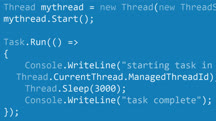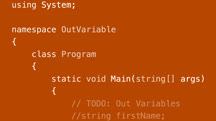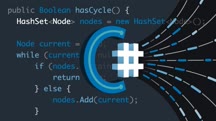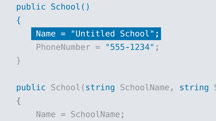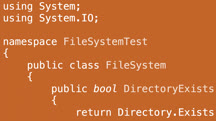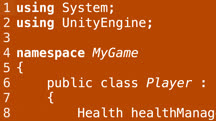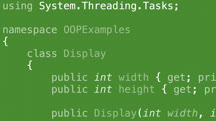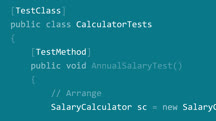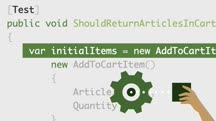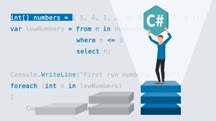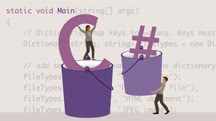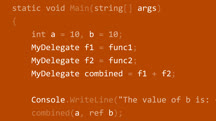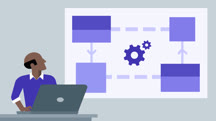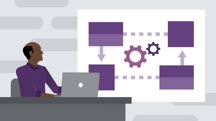Course catalog
Categories
Showing 1,401-1,420 of 8,871 items.
C: Data Structures, Pointers, and File Systems
Broaden your knowledge of C. Take a deep dive into data structures, pointers, and other key concepts in this essential programming language.
C# & .NET: Programming
Learn the essentials of .NET programming in C#, including async programming, multithreading, and string injection.
C# 7 First Look
Explore the many new features in C# 7, the versatile object-oriented programming language designed by Microsoft. Learn about tuples, pattern matching, local functions, and more.
C# Algorithms (218430)
Algorithms are one of the fundamental pillars in every software application, and once you understand them, you can create more efficient and maintainable programs. In this course, instructor Kathryn Hodge shows you how to create better C# programs by using efficient algorithms. Kathryn discusses what makes an algorithm effective, as well as how to make informed assumptions about your data to create better algorithms. She focuses on how to create efficient algorithms to work with different types of data, including strings, arrays, linked lists, queues, stacks, hash-based structures, and trees. Many algorithms are built into the C# language, and Kathryn covers how to use these to create your own custom algorithms, so you can work with your data exactly the way you want. She also dives into how to leverage different data structures to create better algorithms in analyzing or manipulating their data.
C# Best Practices for Developers (140128)
Get into the habit of developing reliable, readable, and sustainable application code by following coding standards with C#. In this course, join instructor Reynald Adolphe as he shows how to go beyond the language syntax and master best practices that can help you produce high-quality C# code. Throughout the course, Reynald shares some of his favorite best practices, illustrating precisely when and where to use each one. Learn about right way to use constructors, manage objects, implement often ignored advantages of getters and setters. Plus, explore best practice resources, including those for essential design patterns.
C# Design Patterns (209488)
Design patterns are an important part of programming. Rather than programming solutions to every issue from scratch, developers can implement these patterns that solve common problems. In this course, instructor Richard Goforth explains the purpose and effective use of key design patterns in C#. Richard begins by discussing why design patterns make sense, what they are, and how they are grouped and categorized. He then provides an overview of the creational, behavioral, and structural Gang of Four design patterns and how they are applied in C# and .NET. Next, he takes a deeper dive into the Iterator, Factory Method, and Adapter patterns, providing hands-on challenges that help you master the application of these patterns in your own code.
C# Essential Training: 1 Syntax and Object Oriented Programming
Learn C# basics, including variables, strings, operations, classes, and methods, as well as the object-oriented features of this versatile programming language.
C# Essential Training: 2 Flow Control, Arrays, and Exception Handling
Get started in Microsoft application development with C#. Learn essential C# techniques for testing code, storing data in arrays, controlling program flow, and handling exceptions.
C# File System Tips and Tricks
Learn how to work with .NET System.IO classes for accessing the file system in your C# application. See how to work with folders and files, organize file access logic, and more.
C# for Unity Game Development
Learn the basics of programming in C# for Unity game design and development.
C# Framework Design
Discover how to design C# frameworks for personal, enterprise, and open-source projects.
C# Object-Oriented Programming Tips and Tricks
Learn encapsulation, inheritance, and polymorphism techniques you can apply when programming in C#.
C# Refactoring Tips and Tricks
Get tips and tricks for refactoring existing C# codebases. Create cleaner, more performant, and readable code with these C# refactoring techniques.
C# Test Driven Development
Catch bugs earlier in your C# applications with test-driven development. Learn how to create new test-driven development projects or add test cases to existing C# projects.
C# Test-Driven Development (218515)
The old carpentry adage “measure twice, cut once” may not seem applicable to programming, but when you consider all the ill effects that bad code can have down the line, doesn’t “test twice, code once” make sense? The later you test, the more effort it requires to fix any issues that may have been introduced months ago. With test-driven development, you create the test first, and then you write the code. In this course, Christian Wenz shows how to apply TDD principles to C# programming. Christian takes a look at TDD in theory (what does it mean and what does a programmer need to know?), as well as in practical terms (how do you use TDD for C#-based projects?). He also illustrates TDD in action by adding tests, offers advice to help programmers understand available frameworks, and looks at more complex scenarios for using TDD like testing web applications and APIs, and replacing database objects during a test.
C#: Advanced Practices (221184)
In this course, instructor Mika Dumont introduces you to C# advanced practices. Mika begins by defining LINQ and showing you how LINQ makes it easy to query any data source. She walks you through how LINQ composes queries written in multiple statements, or even multiple methods, into a single query operation. Mika covers how LINQ works with Entity Framework to query SQL data sources. She describes how async features make it easy to write code that describes what your code does. She goes into how the Task class helps you organize asynchronous algorithms in logical ways. She steps you through how to recover and process asynchronous error conditions from faulted tasks. Mika concludes by explaining the similarities and differences between asynchronous operations and multithreaded, how you can apply similar techniques in both contexts, and how asynchronous operations may be single-threaded.
This course was created by Microsoft.NET. We are pleased to host this training in our library.
This course was created by Microsoft.NET. We are pleased to host this training in our library.
C#: Collections
Learn how to maintain collections of data in C# and choose the right collection class to apply to a wide set of programming scenarios.
C#: Delegates, Events and Lambdas
An in-depth exploration of delegates, events, and lambdas: C# elements for creating more efficient and flexible functions.
C#: Design Patterns
Learn how design patterns in C# can help you build better code. Discover how to implement Gang of Four patterns and two commonly used patterns in .NET.
C#: Design Patterns Part 1 (221507)
Design patterns are an important part of programming. Rather than programming solutions to every issue from scratch, developers can implement these patterns that solve common problems. In this course, instructor Richard Goforth explains the purpose and effective use of key design patterns in C#. Richard begins by discussing why design patterns make sense, what they are, and how they are grouped and categorized. He then provides an overview of the creational, behavioral, and structural Gang of Four design patterns and how they are applied in C# and .NET. Next, he takes a deeper dive into the Iterator, Factory Method, and Adapter patterns, providing hands-on challenges that help you master the application of these patterns in your own code.

